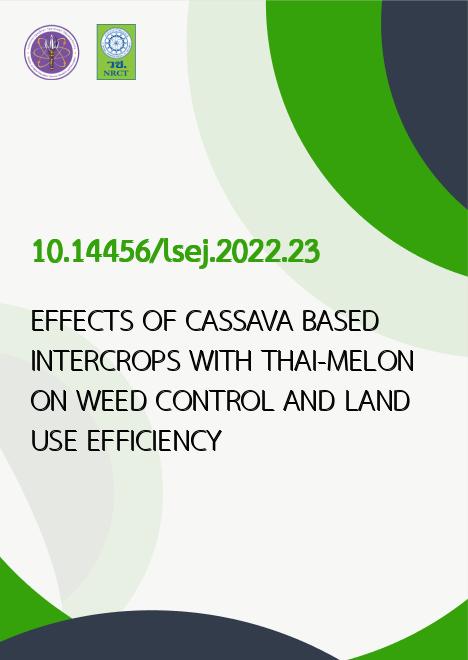
|
EFFECTS OF CASSAVA BASED INTERCROPS WITH THAI-MELON ON WEED CONTROL AND LAND USE EFFICIENCY |
|---|---|
| รหัสดีโอไอ | |
| Creator | Wimonsiri Sehawong |
| Title | EFFECTS OF CASSAVA BASED INTERCROPS WITH THAI-MELON ON WEED CONTROL AND LAND USE EFFICIENCY |
| Contributor | Sayan Subepang |
| Publisher | Pibulsongkram Rajabhat University |
| Publication Year | 2565 |
| Journal Title | Life Sciences and Environment Journal |
| Journal Vol. | 23 |
| Journal No. | 2 |
| Page no. | 297-305 |
| Keyword | Growth and yield, Cassava, Thai-melon, Mono crop, Intercrop |
| URL Website | https://ph01.tci-thaijo.org/index.php/psru/index |
| Website title | Life Sciences and Environment Journal |
| ISSN | 2773-9201 |
| Abstract | The purpose of this study was to study the effect of cassava monoculture and cassava-Thai melon intercrop and land use efficiency. The experimental plan was randomized complete block design (RCBD) three treatments, with three replications: mono cassava, cassava-Thai melon intercrop and mono Thai melon. The results showed that the cassava-Thai melon intercrop had no effect on height, leaf weight and fresh root weight. In addition, it was found that in all treatments, there were nine types of weeds. The densities of weeds in monoculture were significantly higher than that of intercrops. The results of Thai melon found that intercrops had a longer stem length than that of mono Thai melon, but the number of branches per plant in intercrops was less than mono Thai melonIn the intercropping, fruit weight was not statistically different from that of monoculture. However, cassava-Thai melon intercrop had higher land equivalent ratio (LER) than monoculture. In conclusion, Thai melons can be intercrop ped in cassava without affecting cassava yield and Thai melon yield. It also helps to mulch the soil in the early stages of cassava growth and reduce the number of weeds. |